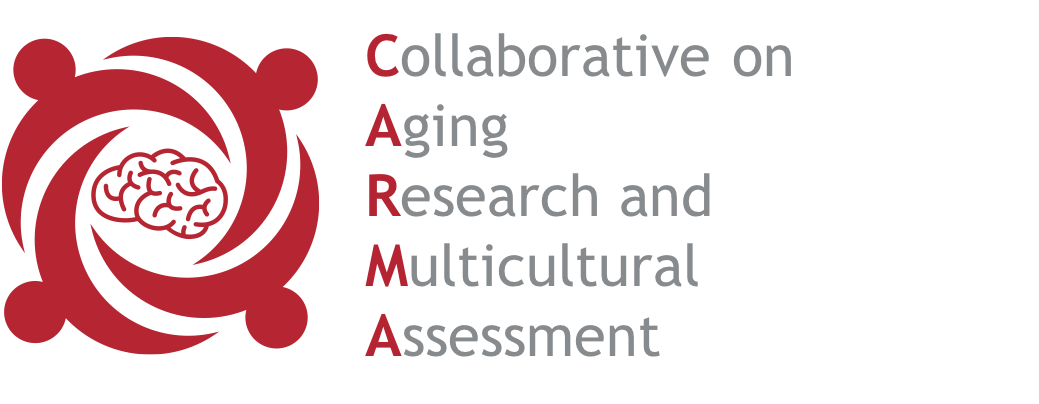About Our Research

The CARMA lab explores the intersection of culture, cognition, and aging, particularly in the context of Alzheimer's disease and related dementias (ADRD).
Of special interest to us is the “Hispanic Paradox” of dementia – for reasons not
well-understood, in relation to non-Hispanic individuals, Hispanic/Latino individuals
are at increased risk for dementia, develop symptoms up to seven years earlier, are
diagnosed and treated later, but live longer with the disease (Alzheimer’s Association, Facts and Figures). In the context of a social justice perspective and existing health disparities,
we examine the biological, psychological, social, and cultural factors that contribute
to the clinical picture –assessment, diagnosis, and prognosis – of ADRD in this largely understudied population.
Current estimates suggest that Alzheimer's disease risk is 1.5-fold higher in Hispanics/Latinos compared to some non-Hispanic populations, although reasons for this remain unclear. By 2050, Hispanic/Latino older adult populations are expected to double or triple, and the number of individuals in these communities with ADRD is projected to increase by 600%, reaching upwards of 1.3 million. A higher life expectancy, growing population trends, and delayed dementia diagnosis and treatment have important and significant societal implications for Hispanic/Latino populations, particularly in areas of clinical, financial, and caregiver burden.
Current estimates suggest that Alzheimer's disease risk is 1.5-fold higher in Hispanics/Latinos compared to some non-Hispanic populations, although reasons for this remain unclear. By 2050, Hispanic/Latino older adult populations are expected to double or triple, and the number of individuals in these communities with ADRD is projected to increase by 600%, reaching upwards of 1.3 million. A higher life expectancy, growing population trends, and delayed dementia diagnosis and treatment have important and significant societal implications for Hispanic/Latino populations, particularly in areas of clinical, financial, and caregiver burden.

Recruitment & Retention of Hispanics/Latinos into Aging Research
A significant limitation to our understanding of ADRD in Hispanics/Latinos, however,
is that most large studies on ADRD do not adequately sample from Hispanic/Latino communities.
These communities are largely underrepresented in research studies due to various
challenges in their recruitment and retention. Given the clear connection to ADRD-related
health disparities in Hispanics/Latinos, one aim of our lab is to better understand and address the reasons why Hispanics/Latinos
are less likely to participate in aging research. Through collaborative efforts as part of the Engaging Communities of Hispanics/Latinos for Aging Research (ECHAR) Network and using principles based on Community Engagement and Community Based Participatory
Research, we apply mixed methods (qualitative and quantitative) approaches to:
-
Document the reasons and challenges that reduce the likelihood of participation
-
Identify key knowledge and information about ADRD that communities perceive as most relevant
-
Determine optimal methods to convey this information about ADRD to Hispanic/Latino communities
-
Develop validated guidelines for the recruitment and retention of Hispanic/Latino individuals into aging research
Assessment and Diagnosis of ADRD Clinical Syndromes in Hispanics/Latinos
The delay in diagnosis of ADRD observed in Hispanics/Latinos may be due, in part, to potential problems with the assessment tools typically used by clinicians when making a diagnosis. Another aim of our lab is to determine the effectiveness of tools used to assess daily function and thinking abilities when diagnosing AD. Current cognitive assessments that examine memory and thinking problems related to AD are not ideal, and they may not adequately diagnose ADRD in Hispanics/Latinos. Another type of test, known as performance-based functional assessments (PBFAs), measures daily functions and examines how people perform certain tasks. PBFAs appear to more directly measure certain abilities related to problems that occur in people with AD, and this type of assessment may be particularly useful when diagnosing AD in this population. This line of research collects and examines information from the following tools/instruments to improve the assessment and diagnosis of ADRD in Hispanics/Latinos:
-
Cognitive testing
-
Performance-based functional assessments
-
Clinical interviews
-
Neuroimaging (primarily from Magnetic Resonance Imaging, or MRI)

Collaborative Efforts for Solving the Hispanic Paradox of ADRD
This research does not and cannot exist in a vacuum. Therefore, as the name indicates,
at CARMA, we collaborate with other researchers, both locally and across the country, with
shared interests. Some of these collaborations involve opportunities to examine:
-
Alzheimer's disease biomarkers (cognitive, biological/neuroimaging)
-
Early-onset autosomal dominant Alzheimer's disease
-
Trajectories of decline in Alzheimer's disease
-
Social determinants of health in diverse aging populations
-
Inflammatory biomarkers of aging and Alzheimer's disease
-
Functional outcomes in neurodegenerative disease
